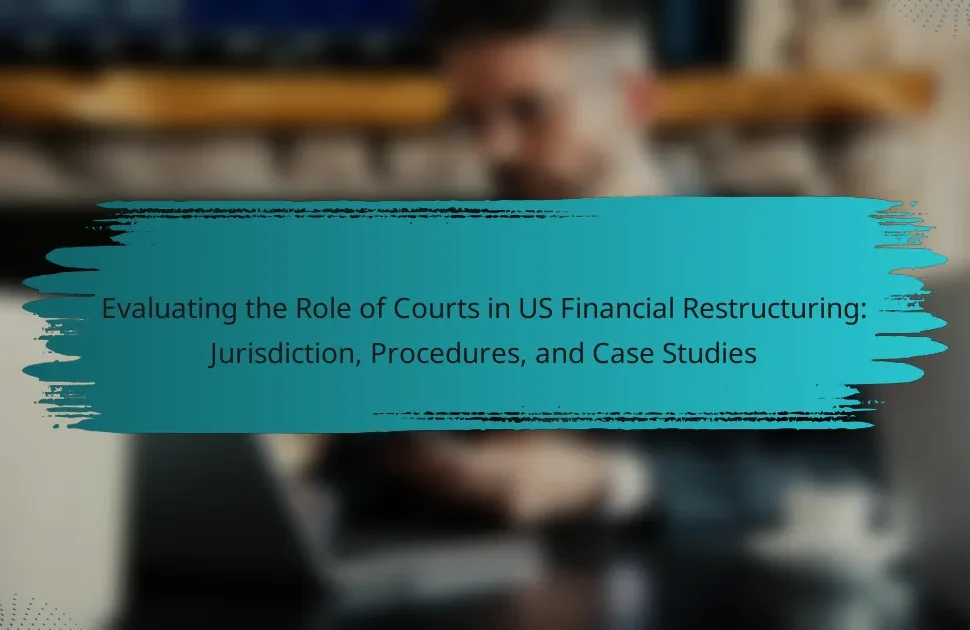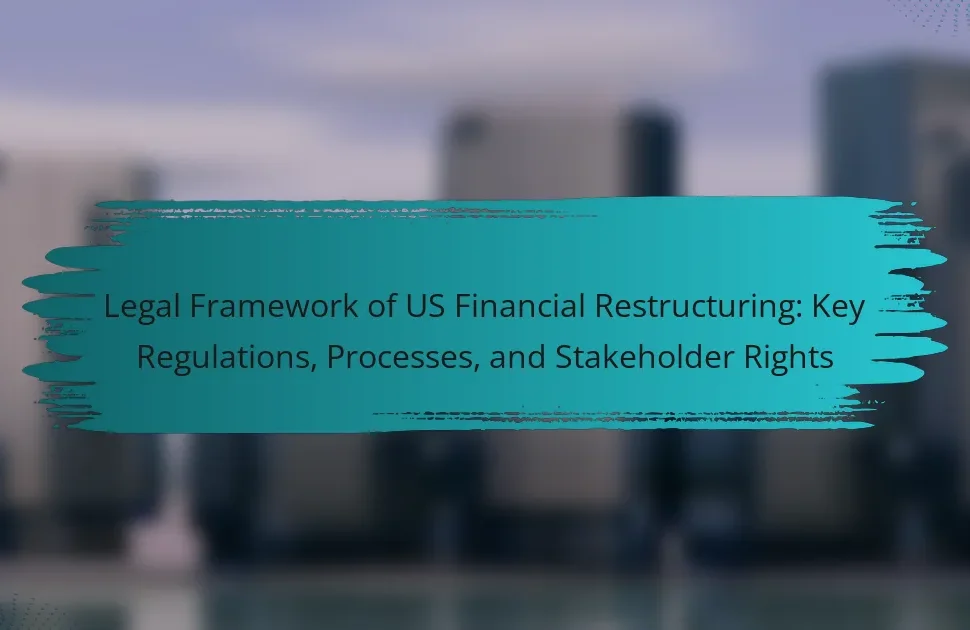Legal counsel is essential in the context of US financial restructuring, providing expertise in compliance with bankruptcy laws and regulations. They assist clients in drafting and negotiating restructuring plans, represent them in court, and protect creditor rights throughout the process. When selecting an attorney for financial restructuring, it is important to evaluate their experience, credentials, and understanding of specific financial situations. Legal fees for these services typically range from $300 to $1,000 per hour, with total costs varying significantly based on case complexity and attorney qualifications. This article outlines the importance of legal counsel, the criteria for choosing the right attorney, and an overview of associated costs.

What is the role of legal counsel in US financial restructuring?
Legal counsel plays a crucial role in US financial restructuring. They provide legal advice on compliance with bankruptcy laws and regulations. Counsel assists in drafting and negotiating restructuring plans. They represent clients in court proceedings related to financial distress. Legal counsel also helps in assessing the viability of restructuring options. They ensure that creditor rights are protected throughout the process. Counsel facilitates communication between stakeholders to achieve consensus. Their expertise is vital in navigating complex legal frameworks and minimizing liabilities.
Why is legal counsel essential during financial restructuring?
Legal counsel is essential during financial restructuring to navigate complex legal frameworks. Financial restructuring often involves intricate negotiations and compliance with bankruptcy laws. Attorneys ensure that all legal obligations are met, minimizing risks of litigation. They also provide strategic advice on asset protection and creditor negotiations. Legal experts help in drafting necessary documents, ensuring they are legally sound. Their involvement can lead to more favorable outcomes in restructuring plans. Studies show that companies with legal counsel during restructuring experience higher success rates. Legal guidance is crucial for maintaining stakeholder confidence and facilitating smoother transitions.
What specific challenges does financial restructuring present?
Financial restructuring presents several specific challenges. One challenge is managing stakeholder expectations. Different stakeholders may have conflicting interests during the restructuring process. Another challenge is maintaining operational continuity. Disruptions can negatively impact business performance and employee morale. Additionally, legal complexities arise. Navigating bankruptcy laws and regulations requires specialized knowledge. Financial forecasting also becomes difficult. Accurate projections are essential for successful restructuring but are often uncertain. Moreover, communication issues can occur. Clear messaging is needed to avoid misinformation. Lastly, costs can escalate. Legal fees and financial advisory costs can burden the organization. These challenges highlight the need for experienced legal counsel during financial restructuring.
How does legal counsel help navigate these challenges?
Legal counsel assists in navigating financial restructuring challenges by providing expert guidance on legal requirements. They help interpret complex regulations that govern financial transactions and restructuring processes. Legal counsel also offers strategic advice tailored to specific financial situations. This includes identifying potential risks and liabilities associated with restructuring. They facilitate negotiations with creditors to achieve favorable terms. Legal counsel ensures compliance with applicable laws, helping avoid costly legal pitfalls. Their expertise often leads to more effective restructuring plans, increasing the likelihood of successful outcomes. Studies show that companies utilizing legal counsel in restructuring often experience smoother transitions and better financial recovery.
What are the key attributes of effective legal counsel in this context?
Effective legal counsel in financial restructuring possesses several key attributes. Expertise in financial law is crucial. This includes a deep understanding of bankruptcy, insolvency, and restructuring processes. Strong negotiation skills are essential for reaching favorable agreements. Effective communication skills help convey complex legal concepts clearly. A strategic mindset allows for innovative solutions tailored to client needs. Proven experience in similar cases builds credibility and trust. Availability and responsiveness ensure timely advice and support throughout the process. Finally, a solid network of industry contacts can facilitate smoother transactions and negotiations.
What qualifications should an attorney possess for financial restructuring?
An attorney specializing in financial restructuring should possess a Juris Doctor (JD) degree from an accredited law school. This foundational qualification is essential for practicing law in the United States. Additionally, they should have a strong understanding of bankruptcy law, corporate finance, and commercial law. Experience in negotiating and drafting restructuring agreements is crucial for effective legal representation.
Moreover, an attorney should have a proven track record of handling complex financial transactions and insolvency cases. Familiarity with federal and state bankruptcy codes enhances their capability to navigate legal challenges. Professional certifications, such as being a member of the American Bankruptcy Institute, can further validate their expertise.
Finally, strong analytical, negotiation, and communication skills are vital for an attorney to effectively advocate for their clients during financial restructuring processes.
How does experience influence the effectiveness of legal counsel?
Experience significantly enhances the effectiveness of legal counsel. Experienced attorneys possess a deeper understanding of legal complexities and procedural nuances. They are more adept at identifying potential pitfalls and crafting strategic responses. Their familiarity with court systems and opposing counsel can lead to more favorable outcomes. Research shows that seasoned lawyers are often more skilled in negotiation and settlement strategies. For instance, a study by the American Bar Association found that experienced attorneys achieve better results in litigation compared to less experienced counterparts. This expertise can save clients time and money during financial restructuring processes. Overall, the influence of experience on legal counsel is substantial and measurable.

How do you choose the right attorney for financial restructuring?
To choose the right attorney for financial restructuring, evaluate their experience and expertise in the field. Look for attorneys who specialize in financial restructuring and have a proven track record. Check their credentials and previous case outcomes. Seek recommendations from trusted sources or professional networks. Assess their understanding of your specific financial situation and needs. Schedule consultations to gauge their communication skills and approach. Review their fee structure to ensure it aligns with your budget. These steps will help ensure you select a qualified attorney for your financial restructuring needs.
What factors should be considered when selecting an attorney?
Experience and expertise in the relevant area of law are crucial when selecting an attorney. An attorney’s track record demonstrates their ability to handle similar cases. Consider their specialization to ensure alignment with your legal needs. Reputation within the legal community can provide insight into their reliability. Communication skills are essential for effective collaboration. Assess their availability to handle your case promptly. Fee structure and transparency about costs are important for budgeting. Client reviews and testimonials can offer additional perspectives on their service quality.
How important is specialization in financial restructuring?
Specialization in financial restructuring is crucial for success. Specialized attorneys possess in-depth knowledge of complex financial laws and regulations. They understand the unique challenges faced by distressed companies. Specialized expertise leads to more effective negotiation strategies. It also enhances the ability to navigate bankruptcy proceedings. According to a study by the American Bankruptcy Institute, specialized legal counsel significantly improves outcomes for clients. This includes higher recovery rates for creditors and more favorable terms for debtors. Overall, specialization directly impacts the efficiency and effectiveness of financial restructuring efforts.
What role does reputation play in choosing a legal counsel?
Reputation plays a critical role in choosing legal counsel. A strong reputation indicates reliability and expertise. Clients often seek attorneys known for successful outcomes. Positive reviews and testimonials enhance trust in a lawyer’s capabilities. Reputation can influence negotiation outcomes and case strategies. According to a survey by the American Bar Association, 75% of clients prioritize reputation when selecting legal representation. This data underscores the importance of a lawyer’s standing in the legal community. A solid reputation can lead to better client relationships and increased referrals. Ultimately, reputation serves as a key factor in the decision-making process for clients seeking legal counsel.
What questions should you ask potential attorneys?
What questions should you ask potential attorneys? You should ask about their experience in financial restructuring. Inquire about their success rate with similar cases. It’s important to understand their fee structure and billing practices. Ask if they have any relevant certifications or specializations. Request references from previous clients to gauge satisfaction. Clarify their communication style and availability. Determine how they will approach your specific situation. These questions help assess their fit for your needs.
How can you assess an attorney’s understanding of your specific needs?
To assess an attorney’s understanding of your specific needs, conduct an initial consultation. During this meeting, ask targeted questions about your case and objectives. Evaluate their responses for relevance and depth. A knowledgeable attorney will provide tailored advice based on your situation. Additionally, observe their ability to communicate complex legal concepts clearly. This indicates their familiarity with your needs. Request examples of similar cases they have handled. This demonstrates their experience and understanding of your specific circumstances. Finally, consider their willingness to listen and adapt their approach to your feedback. This responsiveness reflects their commitment to addressing your needs effectively.
What inquiries help evaluate an attorney’s previous success in similar cases?
Inquiries that help evaluate an attorney’s previous success in similar cases include asking about their case history and outcomes. Request specific examples of past cases they have handled. Inquire about the attorney’s win rate in cases like yours. Ask for references from previous clients who faced similar issues. Investigate their experience with the specific legal area relevant to your case. Confirm if they have handled cases in the same jurisdiction. Evaluate their familiarity with opposing counsel and judges involved in similar cases. These inquiries provide insight into the attorney’s competence and effectiveness.

What are the costs associated with hiring legal counsel for financial restructuring?
The costs associated with hiring legal counsel for financial restructuring typically range from $300 to $1,000 per hour. Factors influencing these costs include the attorney’s experience, firm size, and geographical location. For complex cases, total legal fees can reach tens of thousands to millions of dollars. According to a study by the American Bankruptcy Institute, legal fees represent a significant portion of the overall restructuring expenses. The average legal fee for a mid-sized company can be around $100,000 to $500,000. This investment is crucial for navigating the complexities of financial restructuring effectively.
How do attorney fees typically structure in financial restructuring cases?
Attorney fees in financial restructuring cases are typically structured in several ways. Common structures include hourly rates, flat fees, and contingency fees. Hourly rates are the most prevalent, where attorneys charge for the time spent on the case. Rates can vary based on attorney experience and firm reputation. Flat fees may be used for specific tasks, providing a total cost upfront. Contingency fees are less common in restructuring but may apply in cases with potential recoveries. According to the American Bar Association, fees can also be influenced by the complexity of the case and the attorney’s expertise. Additionally, retainer agreements may be established, requiring an upfront payment for ongoing services.
What are the common billing methods used by attorneys?
Attorneys commonly use several billing methods. These include hourly rates, flat fees, contingency fees, and retainer fees. Hourly rates charge clients based on the time spent on a case. Flat fees provide a set price for specific services. Contingency fees are based on the outcome of a case, where attorneys receive a percentage of the awarded amount. Retainer fees involve an upfront payment to secure legal services. Each method has distinct advantages and is chosen based on the nature of the legal matter.
How can you estimate the total cost of legal services?
To estimate the total cost of legal services, begin by identifying the attorney’s fee structure. Legal fees can be hourly rates, flat fees, or contingency fees. Hourly rates typically range from $100 to $1,000 depending on the attorney’s experience and location. Flat fees are common for specific services like drafting contracts or wills. Contingency fees are based on the outcome of a case, often seen in personal injury lawsuits.
Next, consider additional costs such as court fees, filing fees, and administrative expenses. These can add significant amounts to the total cost. For instance, court filing fees can vary from $50 to several hundred dollars depending on the jurisdiction.
Finally, estimate the expected time commitment for the legal services needed. Complex cases may require more time and resources, leading to higher costs. Gathering all this information allows for a comprehensive estimate of the total legal expenses involved.
What factors influence the overall cost of legal counsel?
The overall cost of legal counsel is influenced by several key factors. These factors include the attorney’s experience and expertise. More experienced attorneys typically charge higher rates. The complexity of the legal issue also affects costs. Complex cases require more time and resources, increasing fees. Geographic location plays a significant role as well. Attorneys in urban areas often have higher rates than those in rural areas. The billing structure used by the attorney impacts the total cost. Hourly rates, flat fees, or retainer agreements can lead to different overall expenses. Lastly, the duration of the legal process contributes to the final cost. Longer cases accumulate more fees due to extended service requirements.
How does the complexity of the case affect legal fees?
The complexity of the case directly influences legal fees. More complex cases require more time and resources to navigate. This often leads to higher hourly rates charged by attorneys. Additionally, intricate cases may involve extensive research, expert witnesses, and additional documentation. Each of these factors contributes to increased overall costs. For example, a simple case may take a few hours of legal work, while a complex case could take weeks or months. As a result, clients can expect to pay significantly more for complex legal matters compared to straightforward cases.
What additional costs should you anticipate beyond attorney fees?
Additional costs beyond attorney fees include court filing fees, expert witness fees, and administrative costs. Court filing fees can vary by jurisdiction, typically ranging from $200 to $500. Expert witness fees are often charged hourly and can range from $150 to $500 per hour, depending on the expert’s experience. Administrative costs may involve document preparation and copying, which can add up to several hundred dollars. Additionally, there may be costs for legal research tools and case management software. These costs can accumulate significantly, impacting the overall financial restructuring process.
What best practices can help manage legal costs effectively?
Establishing a clear budget is essential for managing legal costs effectively. This practice allows clients to set financial limits on legal expenditures. Regularly reviewing invoices ensures transparency and helps identify discrepancies. Engaging in upfront discussions about fees can prevent misunderstandings later. Utilizing alternative fee arrangements, such as flat fees or contingency fees, can provide cost predictability. Prioritizing legal tasks can help focus resources on the most critical issues. Effective communication with legal counsel reduces unnecessary back-and-forth, saving time and money. Lastly, leveraging technology for document management and communication streamlines processes and reduces costs.
The primary entity of this article is legal counsel in the context of US financial restructuring. It outlines the critical role that legal counsel plays in navigating bankruptcy laws, drafting restructuring plans, and protecting creditor rights. The article discusses the essential attributes and qualifications of effective attorneys, the challenges faced during financial restructuring, and the costs associated with hiring legal counsel. Additionally, it provides guidance on selecting the right attorney and best practices for managing legal expenses effectively.




